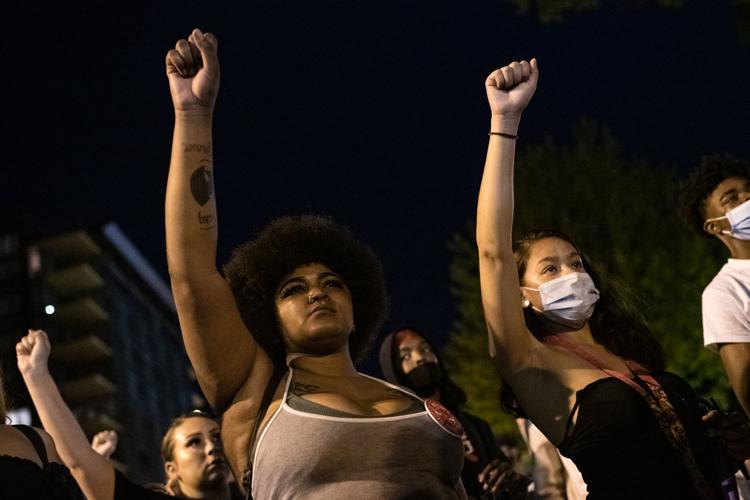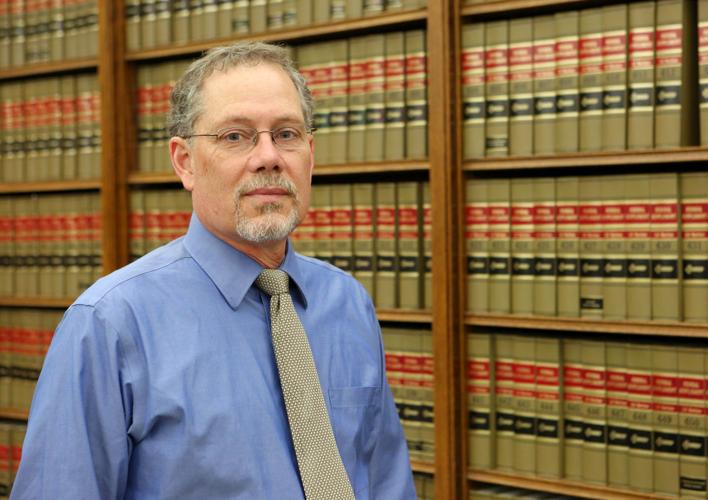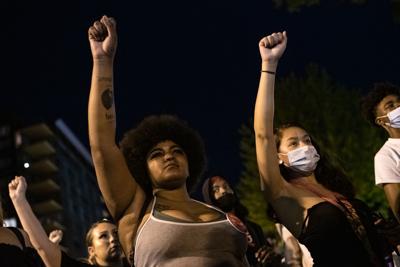Five years after the police killing of Madison teenager Tony Robinson and amid mass nationwide protests over the killing of George Floyd in Minneapolis, the city of Madison is on the verge of implementing major policy changes that could change the dynamic between local law enforcement and the community it polices.
Madison officials are set this week to begin considering civilian review mechanisms, including an independent police auditor and civilian review board, that would add a structural level of accountability between the public and the Madison Police Department.
Keith Findley, co-chair of a city ad hoc committee that recommended these changes, said policing should be “overseen directly by the people.”
“We give the police a lot of responsibility. We expect a lot of them, but we give them the authority and the ability to curtail our liberties, and so how they do that needs to be something that the people have to say,” Findley said.
Others argue that the report’s recommendations are inadequate to inform the conversation city leaders need to be having.
“The report fiddles at the margins of racial oppression and much further and much more drastic action is going to need to be taken,” Matthew Braunginn, a member of the ad hoc committee, said.
As protests stemming from the police killing of George Floyd in Minneapolis have continued for more than a week, activists have focused on a call to defund the police department. Meanwhile, local elected officials are re-focusing on the report’s recommendations that are the result of five years of work examining police procedures and outlining the first steps toward change.
Those come short of the activists’ ultimate demand to move resources out of policing and into community needs like educational opportunities, housing and mental health services. Braunginn said the defunding police proposal is not about “anarchy” or “a free for all.”
“It's saying that this current institution that is in existence is one of racial oppression, and the only way forward is to define and deconstruct this institution and build new ones out of that,” Braunginn said. “It's about the most American thing that there could be: It's about reimagining who we are.”
In recent remarks brought about by outrage over Floyd’s death, Mayor Satya Rhodes-Conway signed on to former President Barack Obama’s pledge calling on mayors to review their police department’s use-of-force policy and to pursue common sense policy reforms.
She also said in an interview that the city should be having conversations around where the city’s resources should be allocated
“Every year, as we come around to the budget, we're sort of begging the community to weigh in on what their priorities are and to help us in crafting very difficult budgets,” Rhodes-Conway said. “I welcome that input feedback on the budget. I have always believed that the way that we create truly safe communities is by making long term investments in people, whether that's affordable housing or childcare or education or mental health.”
Gov. Tony Evers is also calling for law enforcement agencies to implement changes to use of force policies as a part of a Democratic bill. The Madison Police Department’s policies largely align with those changes.
However, a review of MPD’s policies shows it lacks one key component contained in the legislation: if officers do use physical force, it should be the "least amount of force necessary to safely address the threat."
In response to the “8 Can’t Wait” campaign — a series of recommendations for police departments to improve outcomes and community safety — acting Police Chief Vic Wahl outlined how the local agency aligns with policies such as banning chokeholds and requiring de-escalation.

Keith Findley, co-chair of the city ad hoc committee studying police procedures: "The work that's been done so far will be of absolutely no use unless implemented and done in the effective way. And that's hard work. That's tough.”
Five years of work
After Robinson’s death, a resident-led city committee — the Madison Police Department Policy Procedure and Review Ad Hoc Committee — began studying from top to bottom how the police department operates. This committee pushed for a comprehensive review of the MPD from an outside consulting firm, the OIR Group.
At a contentious meeting in June 2016, the City Council adopted a $400,000 resolution to fund the review. This meeting followed an incendiary blog post from former Chief Mike Koval that argued against spending additional money on a study of the MPD.
“You are being watched. And be on notice: this is a pre-emptive first strike from me to you,” Koval said. Though he later said this was meant as a metaphor, council members called his words “divisive” and “inappropriate.” Koval also referred to those calling for police accountability as the “perpetually offended.”
A separate city work group of alders also studied the MPD, making short-term policy recommendations in 2017 across broad areas of mental health, use of force and officer well being.
The city ultimately hired the OIR Group to study the police department. The California-based consulting group released 146 recommendations for the MPD in its full report, which was publishedin December 2017. The OIR Group found that the department can be “unusually progressive, effective, and ‘ahead of the curve’” in some areas but that the past few years have highlighted difficult relationships between the Madison community and police department.
Last October, the ad hoc committee released its final report of 177 recommendations for the MPD, which has already implemented some of the suggestions.
Among the recommendations are proposals to create an independent auditor who would report to a civilian review board. The independent auditor would have the capacity to examine policies, patterns and practices and promote long-term systemic changes on an ongoing basis.
This position would be responsible to a civilian oversight board, which would need to represent the community in all aspects, according to the ad hoc committee recommendations. The oversight body would provide input to elected leaders, conduct an annual review of the chief of police and make policy recommendations, among other responsibilities.
Rhodes-Conway included $200,000 for the auditor position in her 2020 Capital Budget, which was announced shortly after Koval’s abrupt retirement announcement last September. However, this amount does not include additional operating costs associated with the oversight board.
At its Jan. 21 meeting, the City Council adopted the final report of the ad hoc committee.
These civilian review mechanisms are critical to implementing the rest of the recommendations and repairing trust in the community — “one of the great challenges facing the MPD” — according to the ad hoc committee’s report.
“Moreover, a number of serious use-of-force incidents in recent years, as well as conflicts with community members and racial disparities, have created concerns among residents and a breakdown of trust in the MPD in some of Madison’s communities,” the report stated.
In 2012, Paul Heenan was shot and killed by a police officer. Over the past five years, Madison has seen more officer-involved shootings, which include the deaths of Ashley DiPiazza, Londrell Johnson, Tony Robinson and Michael Schumacher. There have been high-profile, non-fatal uses of force by officers, including an incident at East Towne Mall involving an 18-year-old black woman and an officer's response to an incident involving a black teenager in a mental health crisis.
Wahl said the MPD is not opposed to the auditor position but that the “devil is in the details” and that he wants to make sure it’s beneficial for all parties.
"I think it's moving in that direction,” he said. “I think it's important to have that be the first link in the chain, as it were, to have the auditor position, set up and then sort of build off of it.”
The auditor and board are also meant to maintain accountability for how the rest of the recommendations in the ad hoc committee’s report are implemented.
“To ensure, and to give the community the confidence that these recommendations are being acted upon — but they're not just some list of recommendations that sit on a shelf somewhere — there needed to be some mechanism of ongoing oversight, to make sure that they're being implemented in the spirit in which they were made,” Findley said.
For Braunginn, the civilian review mechanisms are a “step in the right direction” and should be encouraged in the interim even though he feels the city should be focusing on bigger changes.
“Some of the mechanisms that within our recommendation and with intention were really about shifting as much power as we can into the hands of the community members when it came to oversight,” Braunginn. “Police are supposed to be serving community members, so community members should have say over police.”

Madison Mayor Satya Rhodes-Conway: “Every year, as we come around to the budget, we're sort of begging the community to weigh in on what their priorities are and to help us in crafting very difficult budgets. I welcome that input feedback on the budget. I have always believed that the way that we create truly safe communities is by making long term investments in people, whether that's affordable housing or childcare or education or mental health.”
Next steps
The proposed auditor and review board will now meet the test of Madison’s committee approval process before the City Council will vote on them potentially later this month.
“I don't want to diminish the work of the committee — because the committee members put in a ton of work — but … the work that's been done so far will be of absolutely no use unless implemented and done in the effective way,” Findley said. “And that's hard work. That's tough.”
Madison committees are scheduled to start discussing the oversight committee and independent auditor this week. The Finance Committee is scheduled to review proposals for a civilian review board and independent auditor Tuesday with the Common Council Executive Committee to discuss the oversight committee June 16.
According to an alternate resolution that supporters say is more in line with the ad hoc committee’s recommendation, the civilian oversight board would address other issues of concern to the community and create an annual report that would include the following:
• An assessment of the the work of the independent auditor
• Activities of the board
• Concerns of community members
• An assessment of the police investigative and disciplinary processes
• Recommendations for ways that police department can improve its relationships with the community, changes to police department policies, rules, hiring, training; and the complaint process
This resolution would also create a workgroup of alders — composed of Alds. Rebecca Kemble, District 18; Shiva Bidar, District 5; and Donna Moreland, District 7 — to oversee the creation an ordinance that would establish independent civilian oversight of the MPD, identify budget measures to support the civilian oversight board and independent monitor, identify community organizations to nominate board members and create a timeline and process for recruitment for members of the oversight board and auditor position.
All alders can participate in the workgroup.
“This will be our collective product,” Kemble said. “This belongs to the whole Council.”
According to the resolution, the workgroup would complete its work in August.
“We spent almost a half million dollars to do our due diligence on MPD and to come up with solid recommendations and then we adopted them and since January the council has not acted,” Kemble said. “It’s time to act.”
A second set of proposals — an ordinance creating an auditor position and a resolution for the auditor’s job — sponsored by Rhodes-Conway and other alders is also on the Finance Committee’s agenda.
The proposed resolution includes a job description, crafted by the city’s Human Resources Department and Deputy Mayor Cam McClay, for the auditor position, which critics say removes teeth from the ad hoc committee’s original recommendation.
For example, the ad hoc committee’s recommendation included subpoena power, authority to appoint counsel to aggrieved individuals and power to undertake independent investigations of personnel. These are not included in the list of dues included in the job description.
But the mayor said that subpoena power must lie with boards, commissions and committees and suggested the civilian oversight committee have that power. Also, she said she wants the position to be at the table throughout any MPD investigations and “watching like a hawk.”
“I think we have taken what the ad hoc recommended, and we have put it into a form that is implementable through the city's hiring process,” Rhodes-Conway said. “I don't think that there are substantial differences, and I think that we're all wanting the same thing: we want a strong and independent auditor position, but I want that person to be hired as soon as possible.”
The mayor said Madison has a “moment” to take action.
“The last thing we need is another committee,” she said. “That’s the work right now is to actually start implementing.”
Some community members who participated in a Facebook Live event organized by Urban Triage Monday say the resolution is the mayor’s attempt to gut the original recommendation for a civilian review board as proposed by the ad hoc committee.
“The mayor is trying to set it up to report directly to the mayor,” ad hoc committee member Greg Gelembuik said. “It becomes Satya’s poodle. We don’t want Satya’s poodle.”
Rhodes-Conway said the position would report to her office just like any other city department head.
“I would not have any more oversight over them than a normal department,” Rhodes-Conway said.
Organizers on the call, including Brandi Grayson of Urban Triage and Amelia and Nathan Royko-Maurer of the Community Resource Team, are encouraging community members to support the alternate resolution.
Addressing the mayor during the live talk, Grayson said she will be voted out of office if she does not align with the community. If Rhodes-Conway doesn’t, Grayson said she will run for mayor.
“If you’re not aligning with what we’re saying as a community across the goddamn nation,” Grayson said, “then we will vote your ass out too and we will find someone to run.”






